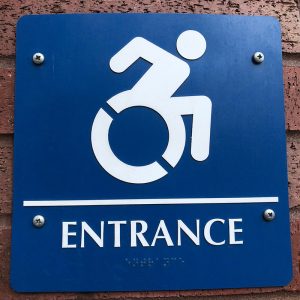ADA signs play a vital role in creating accessible, safe, and welcoming environments for everyone. Required under the Americans with Disabilities Act, these signs help individuals with visual, physical, or cognitive disabilities navigate public spaces with confidence. Whether used in offices, schools, medical facilities, retail stores, or multifamily housing, ADA-compliant signage ensures that essential information is easy to locate and understand. Beyond legal compliance, ADA signs communicate a business’s commitment to inclusivity, professionalism, and customer care.
At their core, ADA signs are designed to make communication clear and consistent. They commonly include raised tactile l ettering, Grade 2 Braille, high-contrast colors, and non-glare materials. These features ensure that the sign can be read both visually and through touch, accommodating as many users as possible. Placement is equally important: signs identifying permanent rooms—such as restrooms, conference rooms, kitchens, and utility spaces—must be mounted at specific heights and locations near the door. These standards allow people to rely on predictable positioning when navigating unfamiliar spaces. For businesses, working with a knowledgeable sign maker helps eliminate guesswork and ensures signage meets local and federal requirements.
ettering, Grade 2 Braille, high-contrast colors, and non-glare materials. These features ensure that the sign can be read both visually and through touch, accommodating as many users as possible. Placement is equally important: signs identifying permanent rooms—such as restrooms, conference rooms, kitchens, and utility spaces—must be mounted at specific heights and locations near the door. These standards allow people to rely on predictable positioning when navigating unfamiliar spaces. For businesses, working with a knowledgeable sign maker helps eliminate guesswork and ensures signage meets local and federal requirements.
Materials and design also play a significant role in ADA signage. While many people picture ADA signs as plain or utilitarian, modern signage can be both fully compliant and visually appealing. Businesses often choose from materials like acrylic, photopolymer, metal, and high-pressure laminate. Each offers different benefits in terms of durability, appearance, and cost. For example, photopolymer signs are ideal for high-traffic environments because they are vandal-resistant and easy to sanitize. Acrylic signs allow for creative layering, color options, and branding elements while still meeting tactile and Braille requirements. A skilled sign maker can guide clients through these choices and help them select the best fit for their space.
For businesses in Florida, working with a Fort Myerssign maker offers the advantage of local expertise and hands-on support. A Fort Myers-based signage provider understands regional building codes, coastal building materials, and the unique needs of Florida businesses, from hospitality and tourism to healthcare and property management. These professionals can assist with every stage of the process—including design, fabrication, installation, and replacement—ensuring that ADA signs integrate smoothly into the overall design of your building. By collaborating with a local expert, organizations can achieve both legal compliance and a cohesive, polished look throughout their property.
ADA signage is more than a regulatory requirement; it is an essential part of creating environments where all individuals can navigate independently. With thoughtful design, durable materials, and guidance from an experienced sign maker, businesses can enhance accessibility while reinforcing their brand identity. Whether updating an existing property or completing a new construction project, investing in well-designed ADA signs helps ensure safety, inclusivity, and long-term value. To learn more contact us at https://fortmyerscustomsigns.com/contact-us/
Leave a Reply